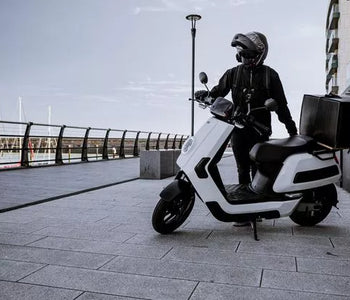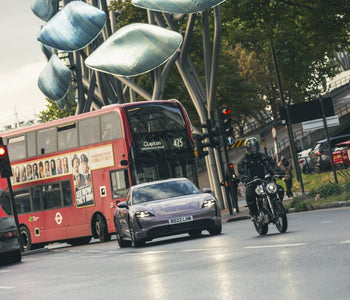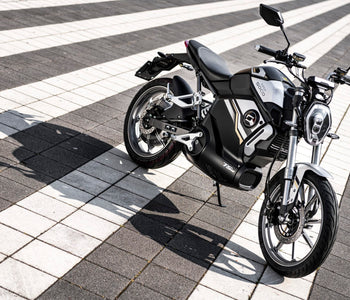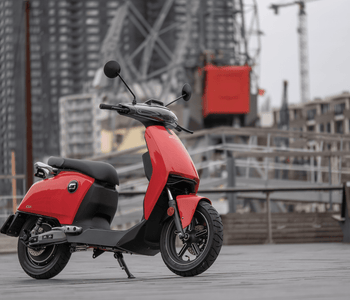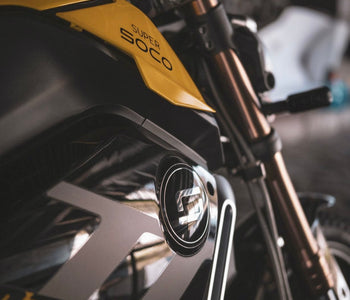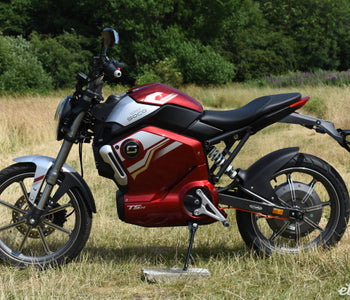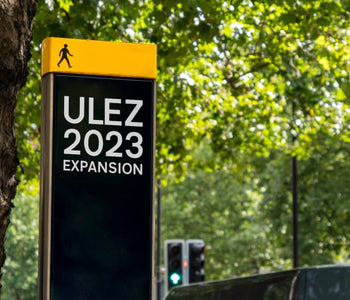

Electric Bike vs Car
One of the most common reactions Electric Bikes get when people are browsing is “I could buy a car for that!”. Which, of course, you could.
Our cities have always been built around car transport and the large supply of second-hand cars means you can purchase an older, perfectly functional hatchback for about the same price as a brand new eBike.
However, the purchase price is only part of the picture. Ongoing insurance, fuel, tax, maintenance and other charges soon stack up and can make a dent in the pocket of even the thriftiest of car owners.
So, how do the figures stack up if we include a typical yearly commute based on the average UK commuter?
Around 67% of people commute by car in urban areas, at an average daily distance of just 11 miles. That’s well within the capabilities of many electric bikes. Most of our mid-range bikes will achieve up to 80 miles on a single charge, with the top end bikes achieving over 100.
Even if you throw in some hefty hills, you won’t need to charge more than once or twice a week.
So on paper, an electric bike can certainly replace the car for most people’s daily commutes.
That doesn’t answer the question of costs though, and £2,000 is a lot of money to stump up for a bicycle. So how do the costs stack up?
Summary - Electric Bikes Are Cheaper to Run
- eBikes are cheaper within 2 months of ownership
- Save £1,300 in the first year of ownership
- Save over £4,000 in 3 years
Electric Bikes are cheaper to own within just 2 months of ownership. After that, the extra associated costs with commuting in a petrol car rapidly made it more expensive.
After the first year, you will save £1,300 with an electric bike. Within 18 months the eBike has paid for itself.
Keep on reading to dive into the details.
Cost of an electric bike vs car
Below we’ve taken the cost of an average family hatchback and taken some ballpark figures for petrol, insurance, MOT etc at time of writing. Of course, your situation may differ slightly. All costs are given as a guide only.
| eBike | Second Hand Car | ||
|---|---|---|---|
| Model |
QWIC RD9 400Wh
|
VW Golf | |
| Cost |
£2,149* | £1,999 | |
| Licence Required? | No | Yes | |
| Cost to Refuel | 0.07p | £50.00 | |
| Cost Per Mile | 0.01p | 0.12p |
*We are assuming a cash purchase, without finance or Cycle to Work salary sacrifice schemes being used.
Running Costs
| eBike | Car | |
|---|---|---|
| Tax |
£0 |
£235 |
| MOT |
£0 | £35 |
| Insurance | £0 | £400 |
| Servicing | £30 | £150 |
| Parts | ~£100 | £500 |
| Running Costs Excl Fuel | £130 | £1,300 |
If we assume you’re driving 5 miles to work (and back) this gives us an average distance of 10 miles per day by car - roughly the UK average for urban commuters. Based on the average days worked in a year (254), that’s around 2,540 commuter miles per year.
Of course, both bike and Car can be used for leisure which will drive these figures up, but for now, let’s just focus on commuting.

Annual Fuel Costs
Based on this, over the course of a year, an eBike will cost you about £25/y in electricity. Even less, if you charge at work.
Meanwhile, a car will cost around £300 (0.12p per mile x 2,540) in petrol for the year.
| eBike | Car | |
|---|---|---|
| Running Costs excl Fuel |
£130 |
£1,300 |
| Fuel Costs |
£25 | £300 |
| Total Cost | £155 (£13pm) | £1,600 (£133pm) |
| Initial Cost | £2,149 | £1,999 |
| Total First Year | £2,304 | £3,599 |
This table quickly shows how much more cost-effective a bike is over 12 months than a car.
So yes, you can buy a car for the same price as an electric bike. However, a car will cost you far more over the course of a year in running costs, and the eBike will quickly pay for itself.
If we take into account running costs, by Month 2 the car has already cost you more to commute with.
| eBike | Car | eBike Savings | |
|---|---|---|---|
| Month 0 Purchase |
£2,149 |
£1,999 | -£149 |
| Month 1 |
£2,162 | £2,132 | -£30 |
| Month 2 | £2,17 | £2,265 | £90 |
| Month 3 | £2,188 | £2,398 | £210 |
| Month 4 | £2,201 | £2,531 | £330 |
| Month 5 | £2,214 | £2,664 | £450 |
| Month 8 | £2,162 | £2,797 | £635 |
By the end of the first year alone, you’ll have saved £1,295 in running costs. The electric bike paying for itself in savings within the second year of ownership.
Over 3 years, the gap increases massively to over £4,000 in savings.
Of course, you may upgrade the bike with accessories or it may need extra servicing one year, but this also goes for cars with customisations and consumables not accounted for in the above tables (Fluffy dice, anyone?).
| eBike | Car | Saving | |
|---|---|---|---|
| Year 1 Total | £2,304 | £3,599 | £1,295 |
| Year 2 Total | £2,459 | £5,199 | £2,740 |
| Year 3 Total | £2,614 | £6,799 | £4,185 |

Can an electric bike replace a car?
Now, there are times when an electric bike might not be as comfortable.
Winter months in heavy rain, or for long journeys that are over 20 miles and a car becomes far more appealing.
However, for most people, most of the time, the electric bike offers a fantastically affordable alternative.
Many of our customers are using the eBike to replace a second car, or will hire cars and taxis on-demand.
Is an Electric Bike faster than a Car?
eBikes are fantastic for making journeys that are uncomfortable on a normal bike easier. Because you’re on a bike, you’re not going to get stuck in traffic and will be able to take quicker, quieter routes.
The reality is that most electric bikes make commuting much faster than a car. Quite simply bikes take up less space, meaning existing road infrastructure can handle more cyclists and less car traffic means the people who need to use a car to commute can do so much faster. Win-Win!
| eBike | Car | |
|---|---|---|
| Commute Distance
| 5 Miles | 5 Miles |
| Daily Commute | 10 Miles | 10 Miles |
| Bike Range | 80 Miles | 400 Miles |
| Refuel Per Week | 1 - 2 | Less than 1 |
| Avg Speed | 12mph | 9mph |
| Commute Time | 50 Minutes | 1hr 5 minutes |
Do you get fit with an electric bike?
Yes! You only get electric assistance when you pedal - so you need to be moving to get the help. In a car, you do nothing. This works wonders for your mental and physical health and easily builds in a bit of daily exercise without too much extra effort.
Niel from CyclingUK had the following to say:
“In September I was driving to work every day and I'm now cycling. In the 10 weeks I lost nine pounds in weight, just using the electric bike.”
Are electric bikes good for the environment?
In short, yes.
They’re far better than petrol or diesel cars for certain, and even better than electric cars too because they simply take fewer materials to create. eBikes produce no pollution in city centres, improving air quality and reducing the number of associated deaths each year.
While the batteries to take some natural resources to make, the impact is minimal and they will last for many years. There’s a huge amount of lifetime emissions wrapped up in cars - from the metal construction of the vehicle through to extraction, refinement and transport of the fuel itself (which is rarely included in emissions calculations).
An electric bike is more resource-intensive to create than a traditional bicycle, however the utility it offers means the lifetime impact far outweighs the cost - especially when people replace their cars.
Conclusion
So, there we have it. In summary, an electric bike has the following benefits over a car:
- No Road tax or insurance
- No need for a licence - anyone can get on and go
- Avoid the traffic and choose your own commute route
- Keep up with traffic, getting away from lights quicker than a traditional bicycle
- Charge the bike at work for free fuel!
- Build fitness into your daily routine
- Pays for itself in under 12 months.
Now of course this isn’t going to apply for everyone, and we are not suggesting that all cars will be replaced with electric bikes.
However, what we are increasingly seeing is that in urban areas, cars are being swapped for electric bikes and people aren’t looking back.
Photos by Daria Shevtsova from Pexels
10 Electric Bike Myths Busted
With electric vehicles continuing to enter the mainstream, many misconceptions continue to float around about electric cars, eBikes and electric scooters, mopeds and motorcycles From battery safety, to questions on their...
Why Delivery Riders Should Choose Electric Mopeds & Scooters.
Over time, the surge in food delivery's popularity has brought a surge of dedicated riders onto our bustling urban streets. These riders put in relentless effort to ensure delectable meals...
VIDEO: Watch Move Electric's epic e-race across London
Whether it's a car, motorbike, quadricycle, bike or scooter, electric vehicles excel in the city – but which will get you where you need to go fastest? To find out we...
How To Care For & Maintain Your Electric Motorcycle
In the not-too-distant future, electric motorcycles will be the main market for motorbikes. Over the last few years, the automotive industry has seen a steep increase in the purchase of...
BIKE MATTERS CUX REVIEW: “IT’S AS EASY AS IT CAN BE TO RIDE”
The guys over at Bike Matters recently spent some time with the Super Soco CUx, using it as a day-to-day scooter with bags of potential to get younger riders on two...
Best Electric Motorbikes 2023 - by 'driving electric'
Here we have the best Electric Motorbikes of 2023 by the 'driving electric' website and have concentrated on the brands we sell. Zero SR/S – from £23,995 Zero is...
eBike Tips review. - Super Soco TSx
Check out eBike Tips latest review of the Super Soco TSx. We have previously tested Super Soco's 'entry level' CU Mini and higher-powered models from Niu here and here. With a powerful hub motor and...
ULEZ Expansion 2023: Embrace the Benefits of Electric Motorcycles & Scooters
Introduction: To combat the detrimental effects of air pollution and promote a healthier environment, the Ultra Low Emission Zone (ULEZ) will undergo a significant expansion across all London boroughs starting...


